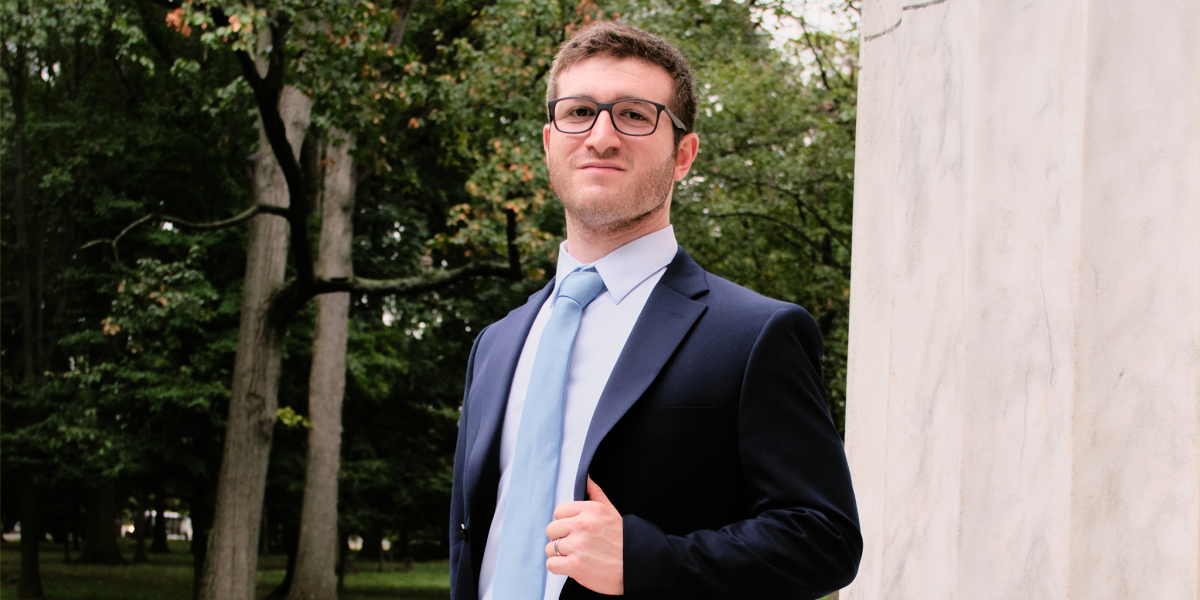A profile of InfoSci alum Aaron Shimanov

InfoSci alum Aaron Shimanov
An experiential learning class taught by TJ Rainsford, director of the iConsultancy Experiential Learning Program, left an enduring impression on Aaron Shimanov, who graduated with bachelor’s degree in information science from the College of Information in 2019, and set him up for success in his career. For the first lesson, Rainsford asked students to interview him. This unexpected prompt produced a funny silence as students grappled with where to start. Rainsford’s approach placed them in the interviewer’s shoes, allowing them to focus not only on responses but also how they were conveyed. Shimanov appreciated learning from someone with an impressive background who respected and genuinely wanted the best for his students.
Beyond the initial lessons, the capstone project—the centerpiece of the curriculum—offered practical challenges in project creation, task deliberation, and success measurement. The tight timeline and barriers presented a real-world test, reinforcing the notion that labs can’t match on-the-ground experiences. “There’s no better lab than the real world—and that’s just what it is,” Shimanov says.
According to Shimanov, the insights gained from Rainsford’s class taught students to start thinking about their futures and take proactive steps. Whether aiming for public service or a corporate role like a senior developer, students were encouraged to “start making plans.” It certainly helped Shimanov do that.
Shimanov encourages current students to not only take a capstone course but also take courses on artificial intelligence (AI) and large language models (LLMs). “It is very misunderstood. I think in general about its impact on society. It is a gray area for ethics, which is always fun.”
Career Highlights
Shimanov grew up near a Navy base in Southern Maryland. His father, an electrical engineer, instilled in him a love for computers at an early age. “I kind of grew up under my older brother and him learning and building computers,” he says.
While in school, Shimanov interned at the Navy base in his hometown. This hands-on experience turned into a full-time role when he graduated. During his time there, he gained invaluable knowledge in areas like network architecture, budgeting, and personnel training. He learned “a lot more about organizations and the importance of how every group plays a role” in the broader system, while also delving deeply into cyber compliance and policy.
In 2022, seeking a new challenge, Shimanov transitioned to Deloitte Consulting where he worked on creating user experiences that integrate technology seamlessly without adding complexity to existing problems. He says, “You can’t just throw technology at a problem and say, OK, it’s going to be better now.” According to him, it’s crucial to understand the logistics behind the scenes and always have a plan B ready for when technology inevitably fails.
Shimanov’s career shifted again when he recently joined the Cybersecurity and Infrastructure Security Agency (CISA), an arm of the United States Department of Homeland Security (DHS). “I thought I had a lot of experience with the Navy. I feel like I really understand the Navy quite well, but I think it would do me good to delve into a different world and try it out,” he says. His background in cybersecurity and a persistent curiosity fuel this exploration.
At CISA, Shimanov orchestrates coordination efforts across various critical infrastructure sectors, such as water, power, medicine, supply chains, and more. “These are all things that are interconnected, and some you might not think have upstream, downstream, or cross-sector impact, but they do,” he says.
The work has tangible rewards, especially in securing national elections. “We have folks working overtime, 24 hours around elections,” Shimanov says. This dedication involves traveling to polling stations and conducting thorough assessments of infrastructure at libraries, schools, and community centers. “These are things that I feel a sense of pride that I’m a part of,” he says.